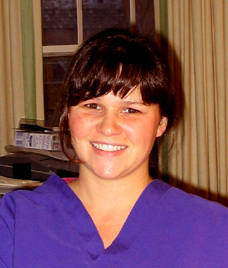Teresa Jahneke decided she wanted to go into dentistry at the
age of five, and under circumstances that proved useful later. At
the time of one of her first visits to a dentist, she had a doll
which had something caught in its teeth. Teresa brought it with
her. The dentist treated the doll like a real person, sitting it up in
the chair, using dental instruments to remove the foreign
material, and discussing in a mock-serious manner the nature of
the problem and its remedy. In this manner the dentist made
both the work on Teresa and the doll an experience that filled
the young girl with delight instead of dread. It also gave her a
sense of how dentistry looks from the dental professionalís point
of view. She became fascinated with the work done on her own
teeth. Initially she followed the dentistís procedures by watching
the reflection in his eye glasses. Given her interest, and the
questions she asked, the dentist was more than happy to place a
mirror on the armature of the dental light, so that his young
patient could see better - and explain what he was doing.
Now, as a professional herself, Teresa finds that taking a similar
approach with children works very well. Giving kids little jobs
to do with the dental instruments and showing them what sheís
doing usually puts them at ease, and for many actually makes
dentistry fun. For children, a lot of the fear involved in dentistry
comes not from anything the professional does, but from being
restrained in an alien environment with sharp or noisy objects
coming at them for no reason they can easily understand. Taking
the mystery out of the process, and giving the kids something to
do makes dental procedures pass quickly.
For older young people and for adults, Teresa usually takes a
different approach. She tries to find out what might cause them
to be uneasy and what parts of their mouths might be
particularly sensitive. For the uneasiness, explanation tends to
help; for parts of the mouth where discomfort might occur, she
seeks ways to work around or ease any pain that might occur.
She gently initiates conversation with patients. Some don't want
to talk, and she lets the conversation lapse. For those who want
to talk, she can work out time frames that allow them to do so.
She does not leave them in a position of many dental patients -
one in which they have to listen to long monologues on subjects
that don't interest them.
Teresa took courses in Dental Prep at Antioch High School. She
worked as a dental assistant for three years after graduation, and
went on to a two year Hygienists' Program at Lakeland College
in Malton, Illinois.
When Dr. Fulmer opened his first office at Paddock Lake,
Teresa was living in the neighborhood. She saw the office sign
when it went up, and stopped in to ask if the doctor was looking
for a hygienist. She was pregnant with her first child at the time.
She began work six weeks before the birth of the child, and
worked right up until the day she went into labor. This says a
number of things about her and about Dr. Fulmer. Although
Teresa may come across as modest and unassuming, she is
completely focused on what she does. She is thorough,
dedicated, and won't leave a job undone. Dr. Fulmer works
closely with his staff and their families, trying to arrange
schedules that allow them time to do what their families need,
and to feel secure in what they're doing at the office. If Teresa
had not felt confident that her job would still be there for her
when she would not have to be with her daughter all the time,
she could not have worked serenely and confidently that late in
her term. Perhaps needless to say, professional and financial
insecurity would not have helped in the delivery of her child.
Teresa and her husband, Ed, enjoy camping, four-wheeling, and
other outdoor activities. Their growing family keeps recreational
activity changing and evolving in new ways. As with other
members of Dr. Fulmer's staff, flexibility of scheduling to
accomodate family needs makes home life easier for Teresa, and
thus removes worries and tensions that might show up in her
work at the dental office.

